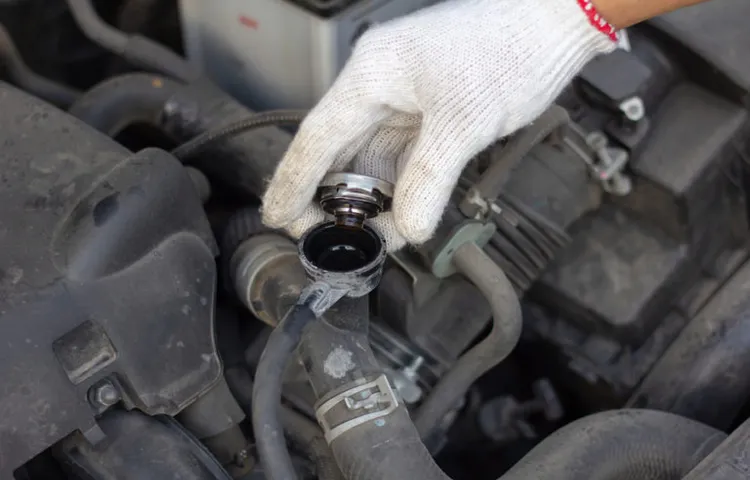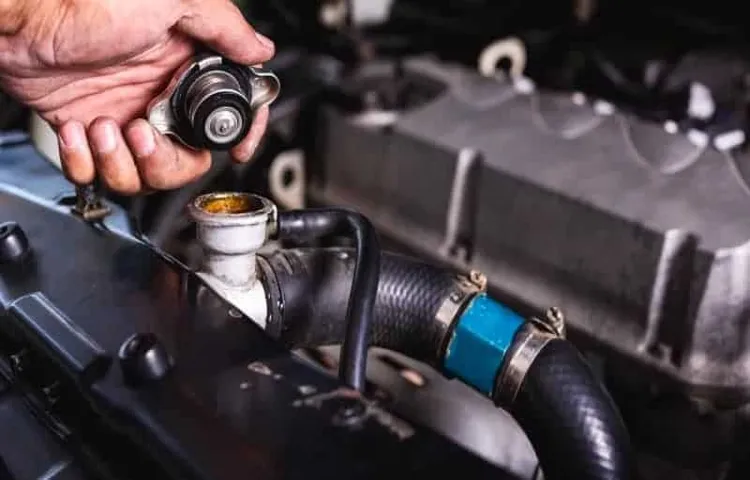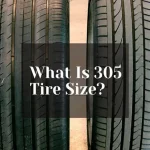Is your car radiator constantly running out of coolant? Have you noticed puddles of coolant underneath your car after it has been parked for a while? If so, you may be experiencing a coolant leak. The coolant is an important component of your car’s engine cooling system that helps keep the engine from overheating. A coolant leak can cause serious damage to your engine if it is not addressed.
But before we dive into the details of why a coolant leak occurs, let’s talk about what coolant is and what it does. Think of coolant as the lifeline that keeps your engine from overheating, much like water is essential for human survival. It circulates throughout the engine, absorbing and carrying away the heat produced by the combustion process.
In this blog post, we’ll explore the possible reasons why your coolant is leaking and what you can do to fix it.
Table of Contents
Introduction
Why Would Coolant Leak? Coolant leaks are a common problem for many drivers, and there are a variety of reasons why they can occur. One reason for a coolant leak is a damaged or worn out radiator. When the radiator is damaged, it not only fails to regulate the temperature of the engine, but it can also lead to a coolant leak.
Another possible reason for a coolant leak is a damaged head gasket. A damaged head gasket can allow coolant to leak into the engine, which can cause serious damage if left untreated. Additionally, a damaged water pump can also cause a coolant leak.
The water pump is responsible for circulating the coolant through the engine, and if it becomes damaged, it can no longer perform this function effectively. Lastly, a damaged or worn out hose or clamp can cause a coolant leak. When these parts are damaged, coolant can leak out of the engine and onto the ground.
Whatever the cause of the coolant leak, it’s important to have it addressed as soon as possible to prevent any further damage to your vehicle.
Explaining the basics of coolant system
Coolant system The coolant system is a critical component of any vehicle that plays a vital role in controlling the temperature of the engine. Essentially, the coolant system is responsible for circulating a mixture of water and antifreeze through the engine block and radiator, which helps to absorb and dissipate the excess heat generated by the engine. This process is essential to prevent the engine from overheating and causing irreparable damage.
In this blog section, we will be discussing the basics of the coolant system, its components, as well as how to maintain it, all of which are crucial to keep your engine running efficiently. So, let’s get started!

What is coolant and what is its function?
Coolant is a liquid that plays a vital role in keeping our vehicles and machinery running smoothly. It is a mixture of water and chemicals that help regulate the temperature of the engine and prevent overheating. The primary function of coolant is to absorb the heat generated by the engine and dissipate it through the radiator.
In doing so, it prevents the engine from reaching temperatures that could cause damage, such as warping or cracking. The most commonly used coolant is Ethylene Glycol, which also helps prevent corrosion and lubricates the water pump. Without proper levels of coolant, the engine would overheat, and its performance would decrease, leading to costly repairs.
So, it’s crucial to check the coolant levels regularly and ensure it’s mixed correctly for your specific engine.
Reasons for coolant leaks
“Why Would Coolant Leak?” A coolant leak in a vehicle can be an alarming problem that requires immediate attention. Some common reasons why a coolant leak occurs are due to a damaged or worn-out hose, a damaged coolant overflow reservoir, a malfunctioning radiator, a failed water pump, or a damaged head gasket. Over time, hoses become worn out and develop cracks, causing them to leak coolant.
The coolant overflow reservoir may crack due to stress or age, leading to leaks. The radiator can also corrode, leading to coolant leaks, and a failed water pump may cause severe leaks as well. A damaged head gasket, on the other hand, is a much more serious issue that can cause other engine problems.
In any case, identifying the source of the problem and getting it fixed immediately can prevent further damage to your vehicle.
Cracks in the radiator
Coolant leaks can be a big headache for any car owner and can lead to serious engine damage if left unattended. One of the most common reasons for coolant leaks is cracks in the radiator. Radiators are one of the most important components of a car’s cooling system and are responsible for keeping the engine cool.
When the radiator becomes old or damaged, cracks can sometimes develop, allowing coolant to leak out. These cracks can occur due to a variety of reasons, including physical damage, corrosion, or simply age. It’s important to regularly inspect your radiator for any signs of damage, such as discoloration, rust, or cracks, and have it repaired or replaced if necessary to avoid more significant damage to your engine.
So, if you notice your car’s coolant level dropping or any signs of heating problems, it’s best to get your radiator checked by a qualified mechanic. By taking proactive measures, you’ll not only be protecting your car but also ensuring your safety on the road.
Loose, damaged or broken hose
A common reason for coolant leaks is a loose, damaged or broken hose. The hoses in the cooling system are an important component that carries the coolant to various parts of the engine. Over time, these hoses can become corroded, worn out, or even cracked.
When this happens, the coolant can escape and cause a leak. Sometimes, a hose may come loose due to a loose clamp, leading to coolant leakage. It’s important to inspect the hoses regularly and replace any damaged or worn-out ones immediately to avoid any catastrophic engine damage.
Remember, prevention is always better than cure, so ensure that you take care of your car by regular maintenance. If you notice a leak or a warning light indicating a problem with the coolant system, take it seriously and have it checked out by a professional mechanic immediately. Your car’s health depends on it!
Faulty water pump
The water pump is a vital component of your car’s cooling system, responsible for circulating coolant throughout the engine to prevent overheating. However, a faulty water pump can cause significant problems, including coolant leaks. There are numerous reasons why your water pump may be failing, such as damaged bearings, a worn impeller, or a damaged seal.
In some cases, a failing water pump can lead to coolant leaks, which can cause your car to overheat and even suffer from engine damage. Therefore, it’s important to have your water pump inspected regularly by a qualified mechanic to ensure that it’s in good working order. If you notice any signs of a coolant leak, such as low coolant levels, a sweet smell coming from under the hood, or steam or smoke from the exhaust, it’s essential to address the issue right away to prevent further damage to your vehicle.
Damaged head gasket
If you notice that your coolant level is dropping, you might be dealing with a damaged head gasket. A head gasket is an essential component that seals the engine’s combustion chamber and cooling system. When the head gasket gets damaged, coolant can leak into the engine oil or the combustion chamber, leading to several issues.
Common reasons for head gasket failure include overheating, poor engine maintenance, and aging. Overheating can cause the head gasket to warp or crack, while lack of proper maintenance can cause coolant to become contaminated and corrode engine components. Additionally, an aging engine can have a weakened head gasket that is more susceptible to damage.
If you suspect head gasket issues, it is essential to get them addressed promptly to prevent further damage to the engine. Replacing the head gasket is a complex and costly repair, but it is necessary to keep your engine running efficiently. So, it’s always best to consult a trusted mechanic if you experience any coolant leaks or other engine issues.
Corroded or damaged freeze plugs
Corroded or damaged freeze plugs. One of the most common reasons for coolant leaks in a vehicle is corroded or damaged freeze plugs. These small plugs, also known as expansion plugs or core plugs, are designed to protect the engine block from cracking due to extreme temperature changes.
However, over time, they can become corroded or damaged, leading to coolant leaks. Corrosion can occur due to exposure to harsh weather conditions or a buildup of debris within the cooling system. Damage can also occur if the engine experiences a sudden increase in pressure, such as from overheating or a faulty thermostat.
Regardless of the cause, it’s essential to address this issue promptly to avoid further engine damage and prevent the vehicle from overheating. A professional mechanic can easily replace any corroded or damaged freeze plugs to ensure safe and reliable engine performance.
Symptoms of coolant leaks
Coolant leaks can be a serious problem for your vehicle, causing it to overheat and potentially leading to costly repairs. If you suspect that you have a coolant leak, there are several symptoms to watch out for. The most obvious sign is a visible pool of coolant underneath your vehicle.
You may also notice a sweet smell or steam coming from the engine compartment, indicating that coolant is leaking and being evaporated by the heat. Another common symptom is an overheating engine. If your engine temperature gauge is consistently spiking, it may be due to a coolant leak.
In some cases, you may also notice that your vehicle is using up coolant faster than usual, requiring frequent refills. If you experience any of these symptoms, it’s important to have your vehicle inspected by a professional mechanic as soon as possible to prevent further damage. So why would coolant leak? It can be caused by a variety of factors, including worn or damaged hoses, cracked or corroded radiator tanks, a faulty water pump, or a blown head gasket.
Regular maintenance and inspections can help catch these issues early and prevent costly repairs down the road.
Overheating engine
Is your car engine overheating? One of the possible causes could be a coolant leak. But how can you tell if your engine is suffering from this problem? There are a few symptoms you can look out for. Firstly, if you notice that your engine is running hot, then this could be a sign that your coolant levels are low.
You may also notice steam rising from under the hood of your car. Another indicator is a sweet smell that comes from running your car’s air conditioning, as this smell could be caused by coolant leaking within the system. If you experience any of these symptoms, it’s important to get your car checked out by a professional mechanic to prevent any further damage.
Remember, neglecting to address this issue could lead to your car engine overheating, and you don’t want to be left stranded on the side of the road. So, keep an eye out for any of these signs and take action promptly if you notice anything unusual to keep your car running smoothly.
Noticeable coolant puddles
Coolant leaks in your vehicle can pose a serious problem. It can cause damage to the engine if left unattended. One of the noticeable signs of a coolant leak is the presence of puddles underneath your car.
These puddles are usually bright green or yellow in color, indicating that it’s coolant. The puddles can be found in various locations – underneath the radiator, near the water pump, or near hoses connected to the engine. If you notice these puddles, it’s essential to take your car to a mechanic as soon as possible.
The mechanic will diagnose and fix the leak, ensuring that your engine is protected and running smoothly. Remember, ignoring the leak may cause severe damage to your vehicle and result in costly repairs. So, keep an eye out for these noticeable coolant puddles and act promptly.
Low coolant level
One of the most common signs of a coolant leak is a low coolant level. This can happen for a variety of reasons, but the end result is the same: your engine is not receiving the necessary level of coolant to keep it cool. If you notice your vehicle’s temperature gauge rising or a warning light on your dashboard indicating low coolant, it’s crucial to take action right away.
Ignoring the problem can lead to serious engine damage, so it’s important to find the source of the leak as soon as possible. You may even be able to visually detect a leak by looking for wet spots or puddles under your vehicle. In any case, always remember to top up your coolant to the correct level and seek professional help if you suspect a coolant leak.
Conclusion
In conclusion, a coolant leak in a vehicle can be caused by a multitude of factors ranging from a damaged radiator to a pesky little gremlin that’s taken up residence under the hood. Regardless of the cause, it’s important to address a coolant leak as soon as possible to prevent further damage to your vehicle and to avoid giving that gremlin an excuse to stick around. So, remember to keep an eye on your coolant levels and don’t let any leak go unattended.
Happy driving!”
FAQs
1. What are the common causes of coolant leaks? A: There are several reasons why a coolant leak may occur, such as a damaged hose, a faulty water pump, a cracked radiator, or a damaged head gasket. 2. How dangerous is a coolant leak? A: A coolant leak should not be ignored, as it can cause the engine to overheat and potentially cause significant damage to the engine components. 3. How can I tell if my car has a coolant leak? A: One sign of a coolant leak is if you notice a sweet smell coming from your engine or if you see a puddle of coolant underneath your car. Another indication is if your engine temperature gauge is showing a higher than normal temperature. 4. What should I do if I suspect a coolant leak in my car? A: It is best to have your car inspected by a mechanic as soon as possible to determine the source and severity of the coolant leak. Continuing to drive with a coolant leak can lead to costly repairs. 5. Can I drive my car with a coolant leak? A: It is not recommended to drive your car with a coolant leak as it can cause severe engine damage and potential safety hazards. 6. How much does it cost to repair a coolant leak in a car? A: The cost of repairing a coolant leak can vary depending on the cause and severity of the leak. It is best to have a mechanic provide an estimate for the specific repair needed. 7. How often should I check my car’s coolant levels and inspect for leaks? A: It is recommended to check your coolant levels and inspect for leaks every 6-12 months or per your car’s manufacturer’s suggested maintenance schedule.



